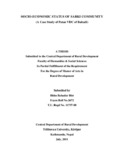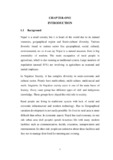Please use this identifier to cite or link to this item:
https://elibrary.tucl.edu.np/handle/123456789/808| Title: | Prospect of Eco-Tourism in Nepal (A Case Study of Dakshinkali Vdc, in Kathmandu District) |
| Authors: | Basnet, Bharat Bahadur |
| Keywords: | Religious tourism;Social-Cultural;Environmental Impact;Eco-Tourism |
| Issue Date: | 2011 |
| Publisher: | Department of Rural Development |
| Institute Name: | Central Department of Rural Development |
| Level: | Masters |
| Abstract: | Nepal as a naturally beautiful country having huge bio-diversity contains great potentiality of religious tourism. Dakshinkali as a hilly natural area with magnificent Himalayan ranges on the east, south and northern side also contains one of the huge potential areas of religious tourism in the country. The main objective of the study is to explore the prospect of religious tourism in Dakshinkali VDC of Kathmandu. The specific objectives are as follows. 1. to explore the socio-cultural aspect of tourism. 2. to analyze the sustainability aspect of Religious tourism in study area. 3. to identify the important Religious tourism of Dakshinkali and expose it. The study is based on primary data from 60 respondents and mainly has revealed that there is great potentiality of religious tourism and essentiality of religion conservation for the sustainable income from tourism sector. To maintain the tourism business with future prospect the values and principles such as ‘Take only photographs leave only foot prints’ are essential to apply. The existed beauty of the place such as heart-touching hilly ranges, cool fresh air, wide coverage on natural forest and topographical scenario etc are the key elements of religious tourism potentiality of the place. The study area is an appropriate site for religious tourism. The sources of tourist attractions like scenic attraction 18%, natural resources 8% and religious prospect 42% and rest of are abundant there in spite of huge potentiality of tourism in general and religious tourism in particular there are various constraints like poor transportation and communication facilities, poor recreational facilities, a limited season, lack of trained manpower, lack of marketing, poor solid waste management system, limited number of educated people. Thus, the future of religious tourism in Dakshinkali is found to be very optimistic and relies heavily on who is responsible for marketing, setting the planning, initiating the entry fees, involving the locals and establishing the infrastructures needed for religious tourism development. |
| URI: | http://elibrary.tucl.edu.np/handle/123456789/808 |
| Appears in Collections: | Rural Development |
Files in This Item:
| File | Description | Size | Format | |
|---|---|---|---|---|
| cover.pdf | 44.33 kB | Adobe PDF |  View/Open | |
| Chapter(1).pdf | 212.2 kB | Adobe PDF |  View/Open |
Items in DSpace are protected by copyright, with all rights reserved, unless otherwise indicated.
